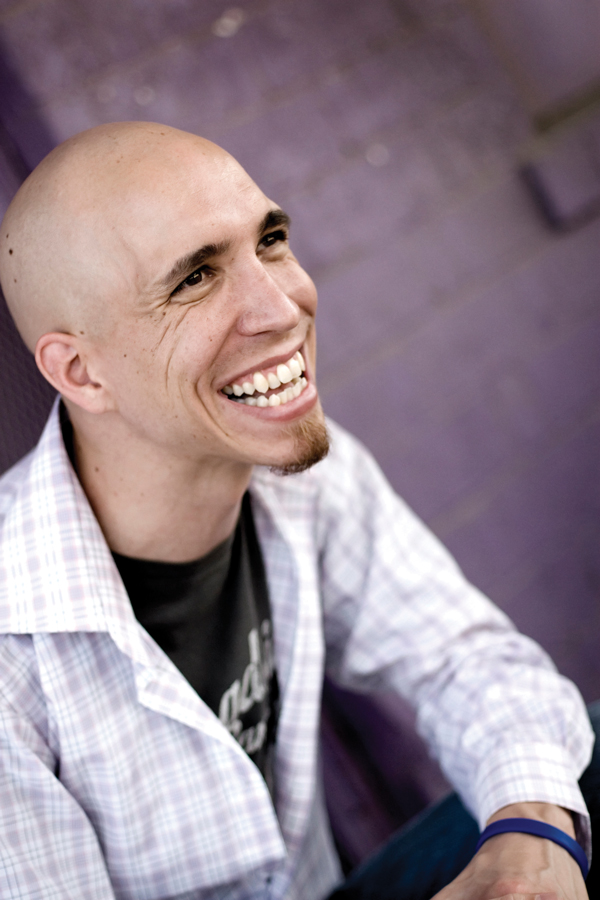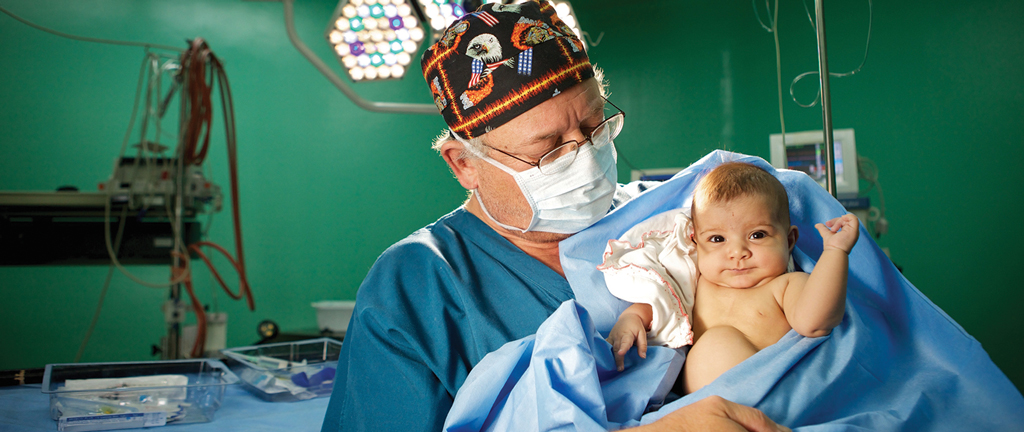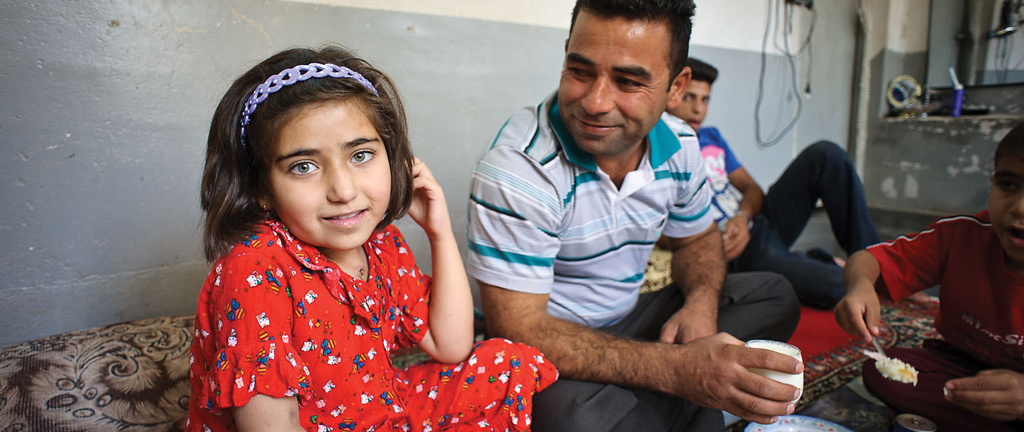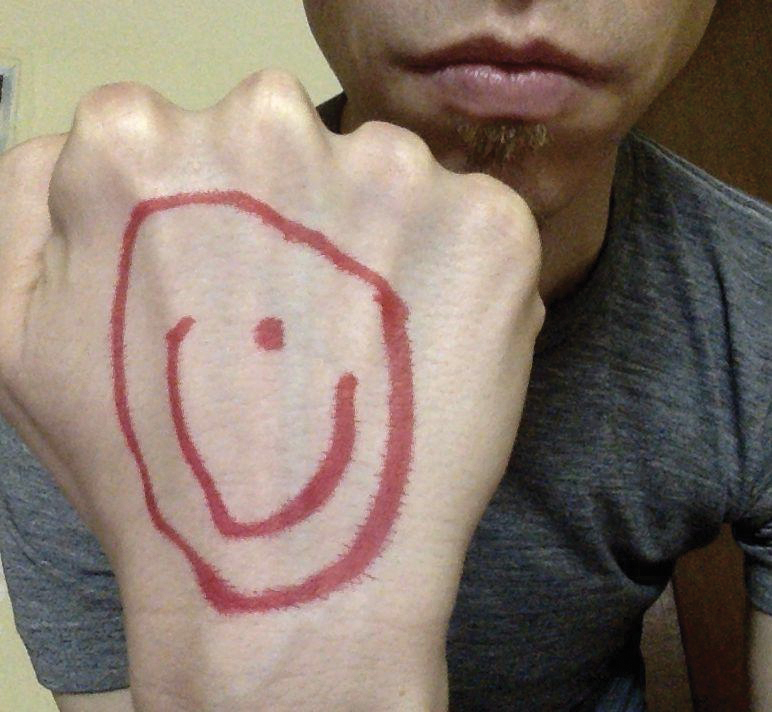Healing the Heart
In Iraq, Preemptive Love Coalition cofounder and Truett alum Jeremy Courtney seeks to save lives, change hearts, and speak for the persecuted across faiths.
"And they spread among the Israelites a bad report about the land they had explored. They said, 'The land we explored devours those living in it. All the people we saw there are of great size. ... We seemed like grasshoppers in our own eyes, and we looked the same to them.'"
Numbers 13:32-33 (NIV)
It was a scouting trip not unlike the one on which Moses sent 12 men to explore Canaan. It was treacherous territory and a seemingly impossible mission.
In 2006, Jeremy Courtney lived and worked in Turkey, but his attention soon moved east to Iraq. Friends in the war-torn country invited Courtney to visit and consider what assistance he and his team could lend to the Iraqi people. His wife Jessica and others in their community remained in Turkey, praying God would give clarity about the possibility of moving to Iraq.
It was a clear picture for Courtney, a 2003 graduate of Baylor's George W. Truett Theological Seminary who began his humanitarian work in Turkey shortly after the attacks of Sept. 11, 2001.
"My report coming back was, 'There are giants in the land. There's no way we can do this. The obstacles are too big. The hardships are too many. No water. No electricity. Violence everywhere. I don’t think Iraq is the place for us,'" Courtney said. "I experienced a lot of violence and saw Iraq through one of the most negative lenses you could have seen it on those trips."
Despite Courtney's report, the Turkey-based team that had been in prayer during his scouting trips was resolute.
"They humbly said, 'We hear you; we hear that it's hard. But we're moving to Iraq. We sense this is what God would have of us, and we need to move forward,'" Courtney said.
Courtney was born in California and moved to Colorado at a young age. His family later settled in Austin, where he attended high school and still considers home. He attended Howard Payne University; there, he met his wife, before moving to Waco in 2001. Jessica attended Baylor Graduate School for international studies while he was at Truett.
"It ended up being very formative years for people who do and care about things we care about," Courtney said. "It certainly shaped us and where we’ve ended up in the world."
Where they "ended up" is the heart of Iraq--literally and figuratively. Courtney is cofounder and executive director of the Preemptive Love Coalition (PLC), an Iraq-based, international development organization with the mission of providing life-saving heart surgeries for children. Along the way, PLC accomplishes much more.
Courtney's first foot in the Middle East door was through an American church that provided humanitarian aid following earthquakes in Turkey in 1999.
"As that church got to know Muslim people, it became an important part of our church’s focus," Courtney said. "We were already thinking down this road, but Sept. 11 showed the salience of what we were trying to do and injected a lot of urgency into it."
Courtney's first trip to Turkey was in spring 2002, and it was a stark contrast from his typical American upbringing.
I was relatively sheltered and secluded (growing up), just by virtue of geography and other factors that dictate who we know and who we interact with," Courtney said. "It wasn't until my first trip to Turkey that I met a Muslim and knew a Muslim as such on their own terms that wasn't mitigated or dictated to me through the media or--perhaps even more--through the pulpit."
Courtney called it a mad dash to understand Islam after the Sept. 11 attacks. And while most of the Western world debated over the religion’s nature, he had a first-hand view.
"The more we dug in, the more we understood the Quran, the more we met Muslim communities across Turkey and ultimately across the world, the more we started to see there’s no such thing as Islam as one monolithic group," he said. "There are all kinds of Islam, and there are all kinds of Muslims--just like Christianity doesn't easily fit into a monolithic box."
Friend and fellow PLC founder Cody Fisher joined Courtney upon his move to Iraq in January 2007. The massive numbers of children who needed help, particularly those in need of heart surgery, overwhelmed them. They discovered that Iraq has one of the world's highest rates of birth defects, largely due to chemical attacks during Saddam Hussein’s reign and the after-effects of the decade-long war. They began PLC’s precursor: Buy Shoes. Save Lives. The international sale of handmade Kurdish shoes raised money for heart surgeries. The total number of pediatric surgeries in Iraq has more than tripled since 2009 with PLC providing an increasing percentage of those procedures each year.
Today, PLC trains Iraqi heart surgeons and nurses so they can address the tens of thousands of Iraqi children in need of lifesaving heart surgeries. This is accomplished through short-term pediatric cardiac surgery and training missions called Remedy Missions, each one of which results in approximately 20 lifesaving operations. PLC also administers the Remedy Fellowship, a 48-week-long program that imbeds international medical teams in Iraq to train local doctors and nurses.
As tensions remain high in Iraq, Courtney and PLC are making a difference, and the impact is not simply medical.
"We did not always have this peace-making dynamic of what we do properly in view the way we have it today," Courtney said. "When we began responding to children who needed heart surgeries, it truly was about heart surgery."
In the early days of their work, Courtney and his partners quickly realized that the people most readily available to perform the surgeries were Israelis. Heart surgeries led to hearts opening.
"As Jews loved Muslims and Iraqis loved Israelis and we as Christians stood in the middle and brokered a lot of that, we were undercutting decades, centuries of violent narrative that these groups had against one another," Courtney said, adding he could see a foundation for peace beginning to form. "The Arabs would come back and tell a very different story of their Israeli counterparts, that the Jew was now the hero that had saved their child's life."
The change of view--and perhaps heart--was reciprocal as Israelis began to see Iraqis through a lens other than, as Courtney puts it, that of Saddam Hussein's violence and Palestinian rhetoric.
"They were able to experience Iraqis in a different way, through the human touch of a parent simply wanting to see their child made well," Courtney said. "Suddenly, peace-making and pursuing peace through communities at odds were thrust to the forefront of what we were dealing with. We thought we were dealing with heart surgeries primarily, but it turns out we were dealing much more with the human condition."
It was a picturesque reflection of the ministry's name. In 2014, the idea of Preemptive Love took on a new face. As the Islamic State in Iraq and Syria (ISIS)-sponsored violence and persecution escalated, ISIS began marking Christian homes in Iraq with the Arabic letter "N" for Nazarene. Courtney made a social statement that soon spread worldwide.
Courtney drew the Arabic "N" on his hand, took a picture and posted it on Twitter in hopes of drawing attention to the persecution. It worked. More than 1,000 retweets followed, and the "#WeAreN" movement was born. Soon, many American Christians were changing their Facebook profile pictures to an Arabic "N" in hopes of drawing attention.
"We were trying to sound the alarm for all the persecuted groups of Iraq. ISIS had been beheading Muslims long before Christians were in the news. ISIS had been massacring Yazidis before they were stuck on the mountain. ISIS had been killing Shia Turkmen, and we’ve scarcely talked about that at all."
While much of the attention garnered by #WeAreN focuses on the situation of Christians, Courtney's aim is solidarity with all the people in Iraq. With that in mind, he began deepening his message through blog posts, tweets and numerous interviews with major U.S. television news outlets such as CNN and Fox News. His message was simple: "If one group is marked, we’re all marked."
Courtney has learned a lot over the past eight years while in Iraq, especially about the country itself.
"Iraq is not one big monolith where every city is the same and every city is a violent, desert town with guys wearing head scarves and black ski masks, trying to hurt others," he said. "There are wonderful mountain ranges, beautiful southern swamplands that have rich wildlife and beauty unlike anything we’ve seen before."
Courtney said that, like the country's topography, there are different levels of violence in Iraq. While he has experienced his share of violence, the area around his home has been mostly spared.
"We've experienced the occasional car bomb or spate of kidnappings that concern us deeply," he said. “We've had very acute moments of personal violence threatened against us, death threats and individuals ... who tried to harm us. But in terms of widespread, war-like violence, that hasn't necessarily always been on our doorstep as we've traveled to those areas to try to bring peace and hope and our life-saving services to those that are most beset by violence."
Although the focus of America’s social microscope moves onto and off of Iraq, Preemptive Love Coalition and Courtney are not going anywhere any time soon.
"It's been hard for us in Iraq over the past couple years to keep the public’s collective attention focused in any way on Iraq," he said. With the homes of Christians targeted, people are concerned again--even if primarily for the Christian communities in Iraq.
"At the very least, it has given us a peg that we can hitch our message to and post a more meaningful, robust conversation for everything that's going on in Iraq right now."



